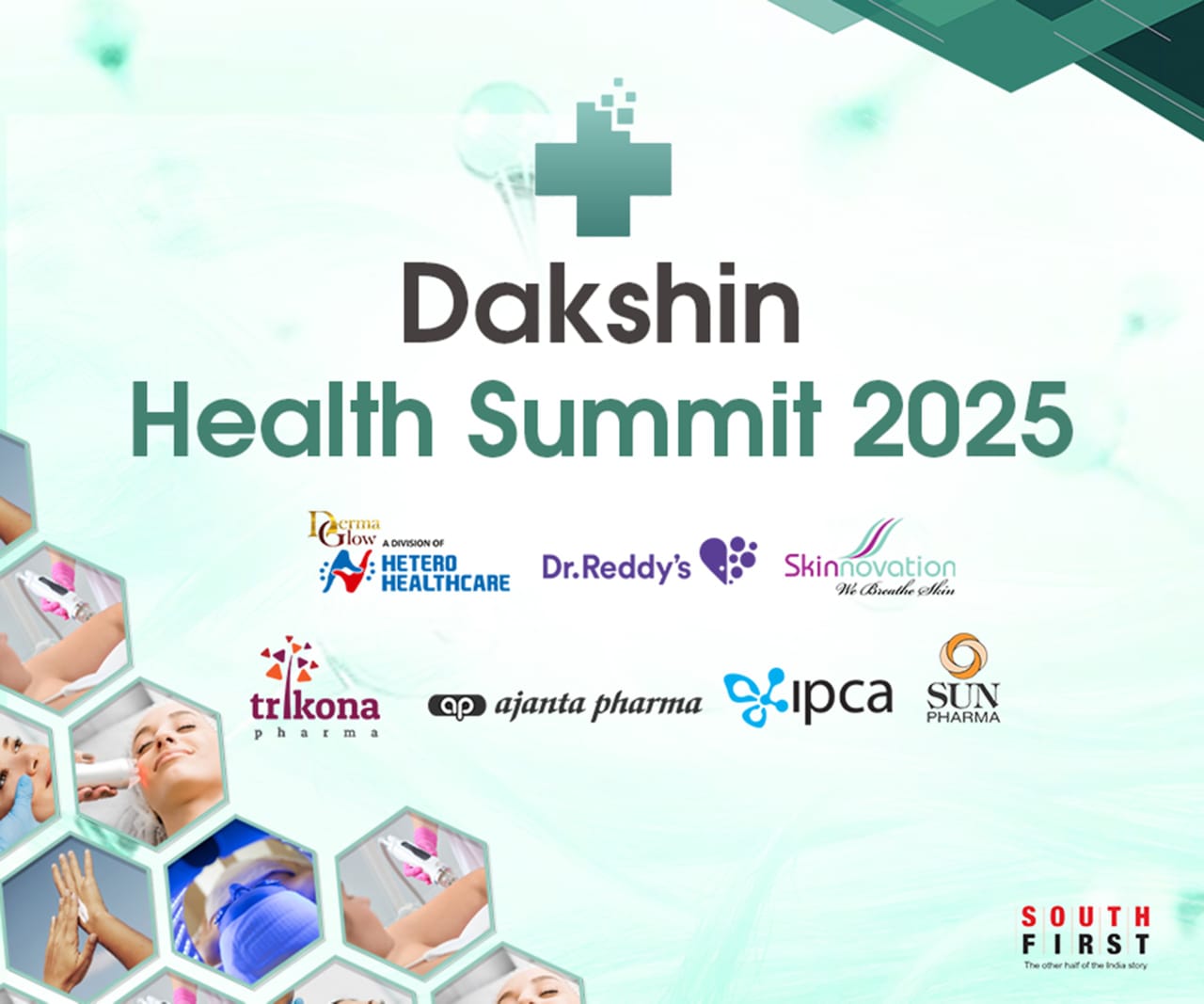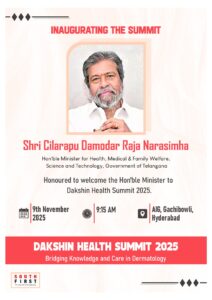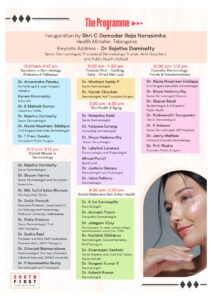Published Nov 02, 2025 | 11:30 AM ⚊ Updated Nov 05, 2025 | 2:42 PM

Dakshin Health Summit 2025
When: 9 November 2025 | 9.15 am onwards
Where: Asian Institute of Gastroenterology, Gachibowli, Hyderabad
Organised by: South First
Organising Chairperson: Dr Rajetha Damisetty
Event Brochure: Click here
Paid Registration: Click here
South First subscribers: RSVP +91-8341082463
(Entry free for South First subscribers. To subscribe, click here.)
As India’s dermatology landscape grapples with an unprecedented crisis of unqualified practitioners, rampant steroid abuse, and social media-fuelled misinformation, the medical community is preparing to take a hard look at itself.
The Dakshin Health Summit 2025: Bridging Knowledge and Care in Dermatology, scheduled for 9 November at the Asian Institute of Gastroenterology, Gachibowli, promises to be more than just another medical conference. It’s a reckoning.
“This isn’t about celebrating the latest aesthetic trend or launching products,” said Dr Rajetha Damisetty, Organising Chairperson of the summit. “This is about dermatologists addressing how unqualified practitioners have infiltrated our field, diluting the science and ethics that define us and putting patient safety at serious risk.”
The summit arrives at a critical juncture for Indian dermatology. Topical steroids are widely available over-the-counter at neighbourhood pharmacies and are doled out liberally for reasons as varied as the desire for fair skin, acne, and fungal infections harming not just the user but causing global health concerns.

Young Indians are experiencing premature hair loss at alarming rates. Social media influencers dispense skincare advice with more reach than qualified dermatologists. And aesthetic procedures are being performed by practitioners with questionable credentials.
C Damodar Raja Narasimha, Minister for Health, Medical & Family Welfare, Science and Technology, Government of Telangana, will inaugurate the summit at 9.15 am, signalling governmental recognition of these systemic challenges.
The day-long conclave is structured around six panel discussions, each tackling issues that the dermatology community has been reluctant to address publicly:
This opening session confronts the elephant in the room: the proliferation of unqualified practitioners and the regulatory gaps that enable them. The panel includes legal experts, medical council representatives, and dermatologists on the frontlines of anti-quackery efforts.
A fireside chat format will tackle the rising incidence of premature hair loss amongst young Indians, examining lifestyle factors, genetic predispositions, and evidence-based treatment approaches beyond quick-fix promises.
From minimally invasive procedures to AI-driven personalisation, this panel explores innovations shaping aesthetic dermatology whilst questioning whether technological advancement has outpaced ethical frameworks.
Perhaps the most anticipated session will examine the steroid abuse epidemic. With panellists from India, Bangladesh, and Nepal, this discussion will explore regional patterns of misuse and potential collaborative solutions.
Dr Shyam Verma, a senior dermatologist and acclaimed researcher, will join pharmacologists and public health activists to address an uncomfortable question: Are governments, doctors and pharmacies enabling over-the-counter access to steroids that are destroying patients’ skin?
An interdisciplinary panel featuring dermatologists, endocrinologists, and nutritionists will discuss preventive skin health and the management of ageing across diverse Indian skin types—moving beyond anti-ageing marketing towards longevity science.
The closing session addresses how Instagram, YouTube, and Facebook have reshaped beauty standards, treatment demand, and the spread of DIY skincare misinformation. Young dermatologists who navigate both clinical practice and digital spaces will share insights on separating trends from evidence.
Amongst the panellists is Dr Sivaranjani Santosh, a Hyderabad-based paediatrician and public health activist known for her successful eight-year campaign against the misuse of ‘ORS’ labelling in commercial beverages. Her efforts led to a landmark October 2025 FSSAI directive protecting children from misleading health claims, a parallel struggle against commercial misinformation that resonates deeply with dermatology’s own challenges.
What sets Dakshin Health Summit apart is its format. Unlike typical medical conferences dominated by presentations and product showcases, this event prioritises extended panel discussions with substantial time for delegate interaction.
“We deliberately chose depth over breadth,” said Chetana R Belagere, Health Editor at South First, the platform organising the summit. “These aren’t topics you can address in 15-minute talks. We need honest, sometimes uncomfortable conversations.”
The summit has partnered with the Neo-ethical Professionals’ Association and its subsidiary, Indian Dermatologists and Doctors Against Quackery (IDDAQ), represented by General Secretary Dr Amarendra Pandey.
Recognising that patient protection requires more than medical knowledge, the summit includes voices from law, public health, pharmacy, nutrition, and even social activism. Karam Komireddy, an advocate, will join the quackery panel, whilst Dr Sharon Baisil, an epidemiologist and AI expert, will contribute to discussions on aesthetic dermatology’s future.
Dr Gitanjali Batmanabane, a pharmacologist and Pro Vice-Chancellor at GITAM University, brings regulatory expertise to the steroid misuse conversation — a perspective often missing from dermatology-only forums.
“We’re calling this a conclave, not a conference, for a reason,” said Vasu Gandikota, Founder & CEO of South First. “Conferences happen frequently. This is meant to be the start of a sustained movement towards ethical, evidence-based dermatological care.”
The organisers hope that by bringing together dermatologists willing to have difficult conversations, the summit will catalyse lasting change — from self-regulation within the profession to advocacy for stronger governmental oversight.
As India’s healthcare landscape evolves rapidly, with increasing patient awareness and growing demand for aesthetic procedures, the stakes have never been higher. Dakshin Health Summit 2025 asks a fundamental question: Will dermatology reclaim its identity as a science-driven medical speciality, which has been infiltrated by unqualified practitioners, steroid abuse, and social media disinformation?
On 9 November, some of the country’s most respected dermatologists will gather in Hyderabad to chart a different course.


